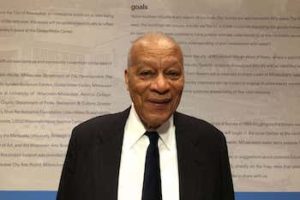
Jay Wright
*Jay Wright was born on this date in 1935. He is a Black poet, playwright, and essayist.
Born in Albuquerque, New Mexico, Wright's mother, Leona Dailey, was of African and Native American ancestry; his father, George Murphy, claimed African, Cherokee, and Irish roots. Murphy held various blue-collar jobs, including construction, driving a jitney, and working as a handyman. However, Wright grew up in foster care in Albuquerque and moved to San Pedro, California, in his teens to live with his father.
When he was in high school, Wright began to play the bass, and jazz music influenced his work in poems such as "Wednesday Night Prayer Meeting," "Billie's Blues," and "Twenty-Two Tremblings of the Postulant." The poet's experience as a jazz bassist is in the poem "The End of an Ethnic Dream." Wright played minor league baseball as a young man. In 1954, Wright served in Germany's U.S. Army Medical Corps until 1957, traveling in Europe. After the Army, Wright studied comparative literature and received his B.A. from Berkeley in 1961 and his M.A. from Rutgers in 1967.
In 1964, he taught English and medieval history for a year at the Butler Institute in Guadalajara, Mexico. After this experience, he returned to Rutgers to finish his M.A. At Rutgers, Wright lived in Harlem, where he met black writers associated with the Black Arts Movement (BAM), including Larry Neal, LeRoi Jones, and Henry Dumas. Wright's first publication was a 22-page chapbook entitled "Death as History," which contained 15 poems and was published in 1967 by Poets Press.
In 1971, Wright's first full-length collection of poetry, The Homecoming Singer, was published by Corinth Press. In this book, Wright "attempts to bridge past and present and meditates on feelings of exclusion from society or personal identity using geographical settings as backdrops for the autobiographical persona's spiritual, emotional, and intellectual growth." The poem that opens the volume, "Wednesday Night Prayer Meeting," features a narrator who is detached from the scene described in the poem and ironically becomes part of "the uncertain, inconclusive encounter between man and God in a Black church." The critical reception of The Homecoming Singer was positive. Wright became a significant voice.
However, in contrast to Wright's later work, the themes of this book have been described as "conventional." In his review of the volume Selected Poems of Jay Wright, Robert B. Shaw also contrasts the earlier volumes with the poet's later work, saying that one may "accept (and enjoy)" the earlier poems "with fewer questions," in contrast to the esoteric difficulty and rigor of the later poems.
Charles H. Rowell associates the poems in The Homecoming Singer and the second section of Soothsayers and Omens with confessional poetry. It focuses on personal, autobiographical experience in contrast to the later poetry, which he characterizes as less immediately personal and grounded more in books and scholarship than in lived experience. Wright has been a poet in residence at Yale University, the University of Dundee, Talladega College, Tougaloo College, and Texas Southern University.
He lives in Bradford, Vermont. However, his work has been compared to Walt Whitman. Others associate Wright with poets Robert Hayden and Melvin B. Tolson due to the complexity of his themes and language, as well as his work's utilization and transformation of Western literary heritage. After receiving the Bollingen Prize in Poetry in 2005, Wright is one of the principal contributors to poetry in the early 21st century.